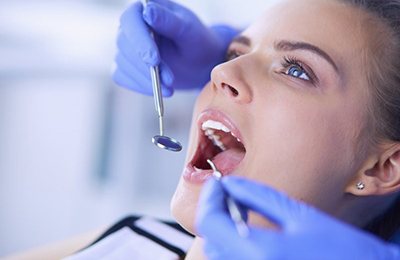If you suddenly experienced a dental injury or developed a painful toothache, would you know what to do next? Many people in need of urgent dental care head straight to their local ER, where they will likely spend hours in the waiting room before being seen by someone with little to no dental training. Should the need ever arise, you should just call Ultimate Dental, and you’ll be able to get the professional care you need right away without the wait, helping you get out of pain as quickly as possible.
Brownstown Emergency Dentist
Expert Care When You Need It the Most

Why Choose Ultimate Dental for Emergency Dentistry?
- Able to handle all kinds of dental emergencies in-house
- Latest technology means faster & more comfortable care
- Highly-trained & experienced team
How to Handle Common Dental Emergencies

Dental emergencies come in two different varieties. They either happen all of a sudden, like a traumatic accident, or they develop slowly over time, such as a severe dental infection. In either case, you should call Ultimate Dental right away so we can schedule an appointment as soon as we can. Otherwise, this will only allow the problem/pain to become much worse!
Before you can make it to our office, there are a few things you can do on your own to take control of an emergency situation:

Toothaches
Rinse and floss around the tooth to remove anything that might be stuck and causing the pain. This often fixes the problem outright! If not, a cavity or cracked enamel is likely to blame, and a cold compress placed on the face or OTC-medicine can help provide temporary pain relief.

Chipped/Broken Tooth
Try to find and gather up as many pieces of the tooth that you can and put them in a safe container until we can see you. To prevent the remaining tooth from scratching the inside of the mouth, place some dental wax or a wet cotton ball over it.

Knocked-Out Tooth
Time is of the essence in this situation, as we can only successfully replant a fully dislodged tooth within an hour or so after the initial accident. Find the tooth, give it a gentle rinse, and try to put it back into its socket. If this isn’t feasible, it should be kept in a container of milk or saltwater. This will help the tooth stay alive until we can see you!

Lost Filling/Crown
Most of the time, a lost filling or crown is no reason to panic, but immediate care is still needed so that the exposed tooth doesn’t develop any more damage or decay. Find the restoration and attempt to place it back onto the tooth. To help with this, a little toothpaste can serve as a temporary glue.
How to Prevent Dental Emergencies

There are a few little things you can do that will go a long way in preventing a dental emergency:
- Wear a mouthguard every time you play sports, regardless of whether or not the game involves physical contact.
- Don’t use your teeth to open boxes, bottles, or remove tags from clothing.
- Don’t chew on hard items like ice, pens, pencils, fingernails, etc.
- Practice consistent oral hygiene so your teeth remain strong and resistant to decay.
- Get regular checkups and cleanings at Ultimate Dental so we can treat small problems before they can turn into an emergency later!
The Cost of Treating Dental Emergencies

There is no set price for treating a dental emergency as every case has its own unique circumstances. For minor toothaches, we can sometimes take care of them with a small filling, while another patient may require both a root canal and a crown. Our primary goal will be to get you out of pain first, and then we can discuss your options for repairing your smile. And, to help with any out-of-pocket costs, flexible financing is always available as well.
Emergency Dentistry FAQs

Even under the best circumstances, dealing with oral pain or a broken tooth still is never ideal and can cause major stress and anxiety. Fortunately, both of our dentist here at Ultimate Dental are able to deliver all kinds of emergency care to relieve your discomfort and get you out of pain and on with your life as soon as possible. To help you better prepare for any potential dental emergency in the future, here are the answers to some of our most frequently asked questions about emergency dentistry.
What Constitutes a Dental Emergency?
Obviously, a broken tooth caused by biting down on something too forcefully is a very different kind of dental emergency than one caused by an infection due to neglected oral hygiene. Because there are so many different kinds of oral health issues, it can be difficult to tell which ones warrant contacting your emergency dentist. The most common signs that you need urgent care are:
- Serious pain and discomfort
- Intense bleeding
- Teeth that are loose, broken, or dislodged altogether
Even if you’re unsure that what you’re going through is a dental emergency, it’s best to err on the side of caution and call us either way. Putting off treatment for a dental issue can result in the problem worsening over time.
Should I Go to the Emergency Room?
In some cases, your first instinct might be to visit the ER instead of your emergency dentist. This is usually the right call if you have a broken or dislocated jaw, profuse bleeding, or are having trouble breathing due to swelling; essentially, if you have a dental problem that could also be considered life-threatening.
However, for regular dental emergencies, your best bet is contacting your dentist’s office. Most emergency rooms aren’t well-equipped to deal with the root cause of dental emergencies, at best being able to write you a prescription for painkillers or antibiotics.
Will My Tooth Need to Be Removed?
You might think that the only way to relieve your pain is to have the problem tooth extracted. However, it’s in your best interest to exhaust all possible treatment options before removing the tooth. When you lose a tooth, your surrounding teeth shift out of place and you’re at a greater risk for further tooth loss. You’ll also have to consider the cost of a replacement. As much as possible, we’ll try to save your tooth with other treatments, but if extraction is necessary, then we’ll make the process as smooth as possible and consider all your options for replacing your tooth.
Do I Still Need Treatment If My Toothache Goes Away?
At first, you might be relieved that your tooth pain has subsided, but if the discomfort was due to an infection, your problem is far from over. A toothache that suddenly disappears might mean that the infection has spread to the center of the tooth and destroyed the nerve, effectively rendering the tooth “dead.” At this point, you’ll need root canal therapy to save your tooth from needing to be extracted and preventing the infection from spreading. Contact us right away so that we can save your tooth.
